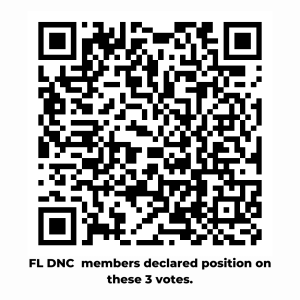The Democratic Progressive Caucus of Florida urges DNC members to
Approve DNC Resolution No. 19 Banning Dark Money from Democratic Primaries, Protect National Convention Governance,
and Reject Sen. Manchin’s Side Deal
- DNC Resolution 19: to Ban Dark Money from Democratic Party Primaries (DPCF recommends supporting the Resolution): additional information at this link
- DNC Resolution 16: (DPCF recommends supporting the Resolution) to Reject Senator Joe Manchin’s side deal: additional information at this link
- DNC Bylaw Amendment 16: on National Convention governance (DPCF recommends opposing the Amendment in its current form): additional information at this link
Participate here (only DNC members)
The Democratic Progressive Caucus of Florida (DPCF) encourages all DNC Members in the Florida delegation voting at the upcoming DNC Meeting to vote in favor of Resolution No.19 “Regarding the Use of “Dark Money” During Democratic Party Primaries.”
We will let the Resolution speak for itself on the particulars. We would point out, however, that the 2022 primary season has demonstrated that dark money groups go after challengers and incumbents alike and that the limited information we have been able to learn about the donors to the dark money groups engaged in 2022 has shown that massive amounts of Republican money flowed into our Democratic primaries.
This Resolution bars only 501(c)(4) money from groups that are not required to disclose their donors. Theoretically, the same donors could still support or oppose a candidate in a Democratic primary; however, they would have to do so transparently by donating to a group that must disclose the identity of its donors. We know from prior experience that many large donors will choose to stay out if they must identify themselves.
Resolution No. 19 is a small but significant step toward campaign finance reform, a step Democrats can take within their Party even as Republicans stand in the way of across-the-board campaign finance reform in Congress and state legislatures.
Supporting Statement by
Carolina Ampudia, M.D., President of DPCF
It is no secret that the elections are losing democracy. Perhaps that is why it is so easy for many people in this country to be convinced that the elections are fraudulent. The idea was easy to sell to the Radical Republican Conservatives. We understand that fraud was not on the ballot, but we know very well that the elections produce less and less citizen representation. We know it, and the majority of voters also notice it.
- How did we get here?
- Why do the elections produce representatives not fully supported by the people?
- Why is it so hard to activate our base?
- Why does it seem like elections are only to represent specific sectors of society?
- What can we do to change the status quo?
The most significant contributing factors to this crisis of representation that occurs in the elections are:
- Gerrymandering – that the representatives elect their people and not the people their representatives – both majority parties are to blame for this.
- Voting Restrictions– Extremist Republicans have consistently been working to reduce voting participation in sectors of society. Evidenced in populations with a high density of black people and people of color, immigrants, poor individuals, and the working class (precisely the ones who need representation the most).
- Lack of common-sense election policies such as automatic voting registrations for all citizens at citizenship adoption and when young voters reach the age majority.
- Limitations of voting by mail, additional requirements, restrictions to the number of ballots that volunteers and family members can collect, and deliver, banning assistance at the voting lines, and reduction of the number of voting locations, especially those found in rural areas and in areas where the individuals described above live, i.e., Black and people of color.
- Unjust laws -that allow taxation without representation, such as: incarcerated people who cannot vote, immigrants, and other residents who pay taxes and cannot decide on representation.
- A weak electoral law –related to a lack of transparency around campaign donors, lack of regulation, and laws allowing reduced to non-existent information to be reported about contributors to campaigns’ information (or disinformation).
Let’s first admit that when elections have no budgetary limitations, it is so expensive to run, this makes it very hard for grassroots candidates to run, and the people suffer. Politicians concentrate vast amounts of time on fundraising, fundraising events, and speaking to donors, to name a few. This cuts into the time representatives should invest in reaching, connecting, and serving the communities they represent. Money should stay out of politics.
Electoral campaigns receive exorbitant amounts of money from corporations and donors from very-deep pockets. The cost of electoral campaigns is high, and the amount of money that circulates during the elections has meant that more and more candidates concentrate their electoral activities on receiving donations, talking to, and making promises that “serve” only influential donors.
Currently, Florida is plunging into one of the darkest periods in its history; we see the vast income gap. It is difficult not to realize that elections will hardly produce accurate representation for those who need it the most, not even the entire population. The facts mentioned above are a disturbing guarantee that the working class will not have voices that speak for them, represent their needs, or come from people who understand their day-to-day issues.
Florida increasingly attracts investors, construction companies, real estate developers, millionaires, and large corporations. Well, in this state, there are no state taxes.Florida is also experiencing the most substantial growth in its history regarding poverty.
Above 40% of Floridians live in situations of poverty, and about 50%, if we also consider those who live in conditions close to poverty. One of the poorest counties in the entire country is in Florida (De Soto), and four of the five cities with the highest rates of the housing crisis in the country are in Florida. With an incidence of child poverty of 18.7 percent, and an average family salary of about 65,000 per year, the ninth lowest in the entire country, it is difficult not to realize that Floridians are suffering.
However, when evaluating the candidates who have a chance of winning in the upcoming general elections, it is easy to realize that the data above does not represent the election results. It is also easy to see the effects of electoral manipulation and the effect of dark money in the elections, pushing elections to the side that best suits large donors and corporations and away from the people who need representation the most.
The Democratic Progressive Caucus of Florida urges the entire Florida delegation to the Democratic National Committee [DNC] to sign in solidarity with the people of Florida. We need party policies that remove corporate money, Super PACs, and other sources of income from electoral campaigns, which limit democracy, and people representation and weaken the working class.
If we are the Party of the People, it’s time to turn those words into action.
This link shows you the declared
intention of our FL DNC members on these 3
areas.




